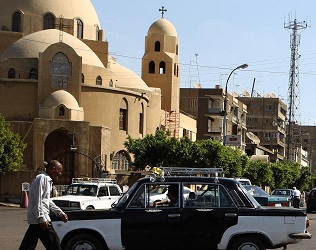
The African Union (AU) High-Level Panel for Egypt “affirmed the correctness” of the July 2013 decision to suspend Egypt’s activities within the union.
The three-man delegation visited Egypt twice in the months following the ouster of former President Mohamed Morsi on 3 July 2013. The panel met with the leading political stakeholders as well as civil society, business and religious leaders.
The panel prepared a progress report containing the details of their visits, which was presented in full to the African Union Peace and Security Council (PSC) on Wednesday evening.
Within the “observations” section of the report, which was published on Thursday, the panel said the decision taken by the PSC in July was correct, adding; “It is important that the PSC remain actively seized of the situation in Egypt to enable it to assess progress towards the full restoration of constitutional order and take the necessary steps in this regard.”
The panel consists of Former President of Mali Alpha Oumar Konare, who heads the panel, former President of Botswana Festus Gontebanye Mogae and former Prime Minister of Djibouti Dileita Mohamed Dilei
Alpha Oumar Konaré, former
The report provided some details of meetings with the interim government, the Muslim Brotherhood, religious leaders, youth movements and business leaders. The members of the panel also were among a select few who were granted an audience with Morsi, who was then being held in an undisclosed location.
The interim government’s interactions with the panel showed its rejection of any instance of characterising Morsi’s ouster as a “coup”. The report read: “To them what Egypt witnessed on 30 June 2013, culminating in the 3 July change, was a full-fledged popular revolution.” The government officials stressed that the events were “by no means unconstitutional”.
The panel members said their request to meet Morsi in July “was readily granted by the Egyptian authorities”. During their meeting they “sought his [Morsi’s] views on the management of his year-long presidency and the circumstances that led to his ouster”. The panel members stressed to Morsi the necessity for his supporters “to refrain from violence and to constructively engage in the search for a solution to the crisis”. At the time Morsi’s supporters had set up two large sit-ins in the Greater Cairo area and clashes occurred often between security forces and the participants of the sit-ins. In response to the panel Morsi told them that he rejects violence, adding “that [he] had no ways of communicating with his followers and supporters”. The panel’s request for a second meeting with Morsi when they returned at the end of August was rejected by the authorities, who stated that “it would not be possible to arrange for meetings with individuals who are under trial by the Egyptian Judiciary or detained based on decisions issued by the Public Prosecutor’s Office.”
Representatives of the now outlawed Muslim Brotherhood told the panel that they welcomed the PSC’s decision to suspend Egypt from the African Union. They “complained against arbitrary arrests and killings of their members, and rejected accusations that they were resorting to violence to further their agenda.”
The Brotherhood representatives told the African diplomats that Morsi’s offer of cabinet positions to the main opposition bloc was rejected, adding: “His calls for dialogue and reconciliation were not taken seriously.” They accused businessmen from the era of former President Hosni Mubarak of leading a “smear campaign” against Morsi in the media.
During their meetings the panel pointed out that the PSC’s decisions “should not be misconstrued as a punitive measure”. The PSC at the time said that Morsi’s removal “did not conform to the relevant provisions of the Egyptian Constitution and, therefore, fell under the definition of an unconstitutional change of government as provided for in the relevant AU instruments”, which prompted the suspension.
The panel ended its report by reaffirming its “commitment to continue discharging its mandate and readiness to further interact with the Egyptian authorities and other stakeholders”. It added that it hoped the upcoming elections would mark the end of Egypt’s transition process.


